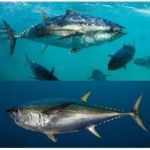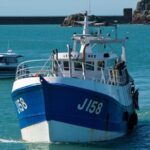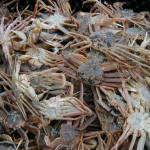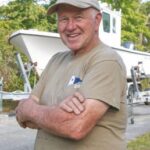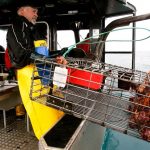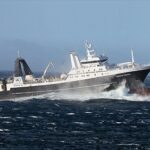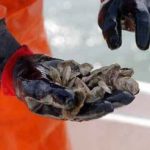Daily Archives: July 5, 2016
Arctic Nations to discuss controls for a potential Arctic fishery in international waters.
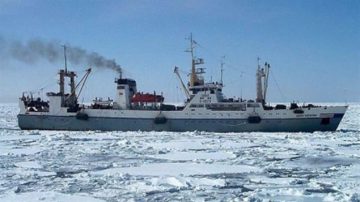 Arctic nations and several others will meet in Iqaluit in northern Canada this week to discuss controls for a potential Arctic fishery in international waters. The meeting takes place in Iqaluit, Nunavut, Canada from July 6-8. Since the beginning of human history, the central Arctic ocean has been frozen over and inaccessible to ships. With global warming and climate change, the Arctic ice has been retreating significantly and there are thoughts now that the international waters at the top of the world may soon be accessible by commercial fishing ships. Indeed in 2012, about 40 per cent of the central area was ice free. As it is considered international waters, the area is not currently regulated by any international fishing agreements. Plenty of Pew pablum. Read the rest here 16:41
Arctic nations and several others will meet in Iqaluit in northern Canada this week to discuss controls for a potential Arctic fishery in international waters. The meeting takes place in Iqaluit, Nunavut, Canada from July 6-8. Since the beginning of human history, the central Arctic ocean has been frozen over and inaccessible to ships. With global warming and climate change, the Arctic ice has been retreating significantly and there are thoughts now that the international waters at the top of the world may soon be accessible by commercial fishing ships. Indeed in 2012, about 40 per cent of the central area was ice free. As it is considered international waters, the area is not currently regulated by any international fishing agreements. Plenty of Pew pablum. Read the rest here 16:41
Macduff Shipyards completes and delivers ‘REBECCA FR 143’
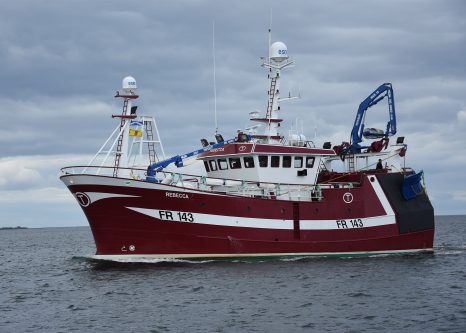 Macduff Shipyards Limited’s latest newbuild, ‘REBECCA FR 143’, has been delivered to Adam, Adam Junior and Jonathan Tait of Fraserburgh, UK. This is the third vessel built for the owners in less than 10 years and replaces their previous Rebecca, which was also built in the Macduff Yard in 2008. REBECCA is a new model of twin rig trawler from the yard, which incorporates numerous design changes to the hull form based on CFD research to improve efficiency whilst both trawling and steaming.The vessel has a double chine hull form with a bulbous bow and transom stern. With the exception of the wheelhouse and masts the entire vessel is built from Lloyds Grade A steel. Read the rest here 15:01
Macduff Shipyards Limited’s latest newbuild, ‘REBECCA FR 143’, has been delivered to Adam, Adam Junior and Jonathan Tait of Fraserburgh, UK. This is the third vessel built for the owners in less than 10 years and replaces their previous Rebecca, which was also built in the Macduff Yard in 2008. REBECCA is a new model of twin rig trawler from the yard, which incorporates numerous design changes to the hull form based on CFD research to improve efficiency whilst both trawling and steaming.The vessel has a double chine hull form with a bulbous bow and transom stern. With the exception of the wheelhouse and masts the entire vessel is built from Lloyds Grade A steel. Read the rest here 15:01
Shrimp slaves are a sign of the international seafood industry which we cannot compete with
 It’s been almost eight months since officials in Thailand raided a shrimp-peeling shed and freed dozens of Burmese slaves. Also last year, an investigation by The Associated Press led to the freeing of 2,000 slaves that were being held on an Asian island and being forced to process seafood that was on its way to Thailand and the U.S. The people who have been discovered and freed from those operations are in the minority. Far more remain in bondage, helping to produce the seafood that eventually makes its way into our nation. The fact is that much of the international seafood industry is fueled by slave labor and other unsavory practices. Our shrimpers cannot compete with industries that make widespread use of slave labor. Read the rest here 14:25
It’s been almost eight months since officials in Thailand raided a shrimp-peeling shed and freed dozens of Burmese slaves. Also last year, an investigation by The Associated Press led to the freeing of 2,000 slaves that were being held on an Asian island and being forced to process seafood that was on its way to Thailand and the U.S. The people who have been discovered and freed from those operations are in the minority. Far more remain in bondage, helping to produce the seafood that eventually makes its way into our nation. The fact is that much of the international seafood industry is fueled by slave labor and other unsavory practices. Our shrimpers cannot compete with industries that make widespread use of slave labor. Read the rest here 14:25
Seafood vendors in China selling ‘sewer shrimp and fish’
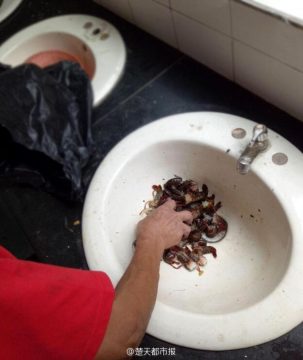 Internet users were horrified to find photographic evidence that showed seafood vendors in Wuhan, China scavenging discarded shrimp and fish from the city’s sewers to serve to unsuspecting customers. According to Shanghai List, it is not uncommon for shrimp and fish waste to show up in the City’s sewers. Seafood brought into the markets of Baishazhou in Wuhan frequently end up falling in the sewers during the packaging process. It can be assumed that once the fish and shrimp fall into the sewers, that should be the last anyone sees of them, but not in Wuhan. Apparently some vendors “rescue” the seafood and after rinsing it off in the public bathrooms, sell the seafood to unwary customers. Read the story here 12:53
Internet users were horrified to find photographic evidence that showed seafood vendors in Wuhan, China scavenging discarded shrimp and fish from the city’s sewers to serve to unsuspecting customers. According to Shanghai List, it is not uncommon for shrimp and fish waste to show up in the City’s sewers. Seafood brought into the markets of Baishazhou in Wuhan frequently end up falling in the sewers during the packaging process. It can be assumed that once the fish and shrimp fall into the sewers, that should be the last anyone sees of them, but not in Wuhan. Apparently some vendors “rescue” the seafood and after rinsing it off in the public bathrooms, sell the seafood to unwary customers. Read the story here 12:53
Thai seafood company to add N.B. lobster producer Chez Nous to its holdings
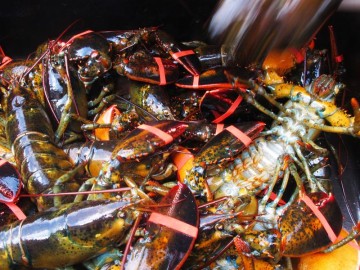 The Thai seafood company that owns Chicken of the Sea Frozen Foods is acquiring a majority stake in a Canadian lobster processor based in northeastern New Brunswick. Thai Union Group PLC didn’t disclose how much it will invest in Les Pecheries de Chez Nous but said its current chief executive, Francois (Frankie) Benoit, will retain a minority stake. Chez Nous has its office about 220 kilometres north of Moncton in the coastal community of Tracadie-Sheila, N.B. It employs up to 200 workers at the height of lobster season and generated $50 million in revenue in 2015, according to Thai Union’s announcement from Bangkok. Thai Union says its acquisition of Orion Seafood International in 2015 made it one of the largest sellers of North Atlantic lobster in the United States. It expects to solidify that position with the addition of Chez Nous. Link 12:26
The Thai seafood company that owns Chicken of the Sea Frozen Foods is acquiring a majority stake in a Canadian lobster processor based in northeastern New Brunswick. Thai Union Group PLC didn’t disclose how much it will invest in Les Pecheries de Chez Nous but said its current chief executive, Francois (Frankie) Benoit, will retain a minority stake. Chez Nous has its office about 220 kilometres north of Moncton in the coastal community of Tracadie-Sheila, N.B. It employs up to 200 workers at the height of lobster season and generated $50 million in revenue in 2015, according to Thai Union’s announcement from Bangkok. Thai Union says its acquisition of Orion Seafood International in 2015 made it one of the largest sellers of North Atlantic lobster in the United States. It expects to solidify that position with the addition of Chez Nous. Link 12:26
Marine ecosystems still at risk as ‘the blob’ sinks deeper below the surface, says DFO
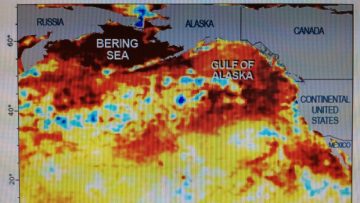 The giant ocean ‘blob’ isn’t dead — yet. The warm patch of water that stretches along the Pacific Coast is currently resting several hundred metres below the surface of the ocean, despite earlier reports that it had dissipated, according to new data. “What we’re finding is that the upper waters are being mixed by the wind again and coming back to normal temperatures, but the residual effect of the blob is still there at about 150 to 200 metres [below the surface],” said Ian Perry, a senior research scientist with Fisheries and Oceans Canada. The blob was widely pronounced dead earlier this year after satellite heat images no longer detected abnormally warm waters on the surface of the Pacific Coast. However, the imaging only read up to 40 metres below the surface, said Perry. Read the story here 11:31
The giant ocean ‘blob’ isn’t dead — yet. The warm patch of water that stretches along the Pacific Coast is currently resting several hundred metres below the surface of the ocean, despite earlier reports that it had dissipated, according to new data. “What we’re finding is that the upper waters are being mixed by the wind again and coming back to normal temperatures, but the residual effect of the blob is still there at about 150 to 200 metres [below the surface],” said Ian Perry, a senior research scientist with Fisheries and Oceans Canada. The blob was widely pronounced dead earlier this year after satellite heat images no longer detected abnormally warm waters on the surface of the Pacific Coast. However, the imaging only read up to 40 metres below the surface, said Perry. Read the story here 11:31
St. Anthony Mayor Ernest Simms says abolishing LIFO not good for St. Anthony economy
 Not everyone in Newfoundland and Labrador has been lobbying to abolish the Last in, First Out policy governing northern shrimp quotas. Now there is a fear in St. Anthony following the ministerial advisory panel’s recommendations. St. Anthony Mayor Ernest Simms says council is hoping Fisheries and Oceans Minister Dominic LeBlanc dismisses the recommendations put forward last week. He said those changes would be detrimental to the economy of the hub of the Northern Peninsula, and devastating to what St. Anthony Basin Resources Inc. (SABRI) has built in recent years. The organization was established in 1997 to manage a special allocation of 3,000 tonnes of northern shrimp for the northern part of the peninsula. The volunteer board is comprised of fishers, fish plant workers, and community and development committee representatives. The organization has agreements, including with two Icelandic companies,,, Read the rest here 11:20
Not everyone in Newfoundland and Labrador has been lobbying to abolish the Last in, First Out policy governing northern shrimp quotas. Now there is a fear in St. Anthony following the ministerial advisory panel’s recommendations. St. Anthony Mayor Ernest Simms says council is hoping Fisheries and Oceans Minister Dominic LeBlanc dismisses the recommendations put forward last week. He said those changes would be detrimental to the economy of the hub of the Northern Peninsula, and devastating to what St. Anthony Basin Resources Inc. (SABRI) has built in recent years. The organization was established in 1997 to manage a special allocation of 3,000 tonnes of northern shrimp for the northern part of the peninsula. The volunteer board is comprised of fishers, fish plant workers, and community and development committee representatives. The organization has agreements, including with two Icelandic companies,,, Read the rest here 11:20
Work on Atlantic Marine Monument not done yet, Eric Reid, North Kingstown, Rhode Island
 In June, House Natural Resources Committee Chairman Rob Bishop, a Republican U.S. Rep. Utah, visited New Bedford and spoke to several members of the industry regarding their concerns about a potential marine monument off the coast of New England. Following the meeting, I remarked to The Standard-Times reporter that a monument could potentially cost the industry up to $500 million in economy activity, in addition to countless jobs. This estimate has been criticized for being far too high. But it is based on two premises — a conservative estimate of the economic impact of fishing in New England, and the lack of clarity surrounding the marine monument discussion. Currently, the commercial fishing industry from Maine to New Jersey brings in an estimated $1.4 billion per year in landings. These landings support hundreds of millions of dollars more in economic activity for related and shoreside businesses, and employ tens of thousands of people up and down the coast. Read the rest here 08:18
In June, House Natural Resources Committee Chairman Rob Bishop, a Republican U.S. Rep. Utah, visited New Bedford and spoke to several members of the industry regarding their concerns about a potential marine monument off the coast of New England. Following the meeting, I remarked to The Standard-Times reporter that a monument could potentially cost the industry up to $500 million in economy activity, in addition to countless jobs. This estimate has been criticized for being far too high. But it is based on two premises — a conservative estimate of the economic impact of fishing in New England, and the lack of clarity surrounding the marine monument discussion. Currently, the commercial fishing industry from Maine to New Jersey brings in an estimated $1.4 billion per year in landings. These landings support hundreds of millions of dollars more in economic activity for related and shoreside businesses, and employ tens of thousands of people up and down the coast. Read the rest here 08:18



































